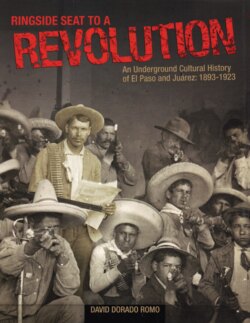Читать книгу Ringside Seat to a Revolution - David Dorado Romo - Страница 41
На сайте Литреса книга снята с продажи.
ОглавлениеLuján, was either killed or captured. The federals left
the corpses of 42 dead rebels hanging on the trees.71
Ochoa escaped by disguising himself as a federal sol-
dier and walking 300 miles back to Texas.
AFTER THE REBELLION was put down, the
Chihuahuan governor offered amnesty to all former
insurgents who laid their weapons down. Only
Ochoa and Benigno Arvizu, another Mexican
American rebel leader, were
denied amnesty on the
ground that these two were
“foreign citizens.”72 The
Díaz regime reportedly
offered a $15,000 reward for
Ochoa’s capture—dead or
alive.73 Victor Ochoa
remained a fugitive until
October 1894 when he was
arrested by the sheriff of
Fort Stockton. But within 10
days, Ochoa—thanks to his
charisma and gift of gab—
had escaped.
The El Paso Times
described the scene of his
escape:
On the afternoon of
Ochoa’s escape from
Fort Stockton, there
was a Democratic
meeting in the court
house and the candi-
dates, among them
Sheriff Royer, who is
standing for reelection,
requested Ochoa to
address the Mexicans in their interest. He
readily consented and the entire Mexican
population flocked to the meeting to hear
him. Ochoa spoke for some time and he
devoted himself almost entirely to the sub-
ject of the recent revolution, and his speech
brought forth the wildest applause. The can-
didates were highly pleased at what they
supposed was an enthusiastic approval of
their desires for office. In consequence a big
baile was given in the same evening and the
general [Ochoa] was allowed to go. He
addressed the Mexicans and was taken back
to jail long after midnight.
Shortly after he was locked up a band of
Mexicans, masked and led by an American,
went to the jail and at the point of their
Winchesters, demanded the keys. They were
promptly handed to them
and Ochoa was released.74
Ochoa only managed to ride
a horse for 90 miles before he
supposedly got stuck in a bog
near Pecos, Texas. Texas
Ranger J. Fulgham found Victor
playing billiards and arrested
him. (Some say Ochoa had
changed his mind about escap-
ing. An American jail was better
than being shot down by boun-
ty hunters.) When interviewed,
Victor was in good spirits. He
had nothing but praise for the
law officer who caught up with
him so quickly. “The Rangers
have treated me nicely and I
wish to thank them.” The feel-
ing was mutual. The Texas
Ranger called Victor L. Ochoa
“the boldest and most daring
off hand man I have ever met
and to me he appears to be in
his proper vocation as a revolu-
tionist.”75
The El Paso Times described
the enthusiastic response the
revolutionist received wherever crowds encountered
him on the train trip back to El Paso:
All along the road from Pecos to El Paso,
Ochoa was a wonder and the object of all
eyes. Mexicans passed through the train and
viewed him with admiration. Americans who
were bolder shook hands with him and
wished him the best of luck. At Sierra Blanca
71
Osorio, Tomóchic en llamas, p. 187.
72
El Paso Times, March 8, 1894. Three years later Benigno Arvizu would be one of the leaders of the Teresista attack on Palomas.
73
Paterson Evening News, May 3, 1912. In some articles Ochoa claimed Díaz’ reward was $50,000. This was probably an exaggerated figure. In
36
1892, for instance, Governor Miguel Ahumada only offered 1,000 pesos for rebel leader Santa Ana Pérez. The contemporary news accounts in
1894 only mention a large bounty, but don’t give the exact amount.
74
El Paso Times, October 24, 1894.
75
El Paso Times, October 25, 1894.
Juan Hart was the editor of the El Paso
Times when Mexican President Porfirio
Díaz banned this newspaper from Mexico
for publishing articles favorable to the
Ochoa revolution, ca. 1910.
(El Paso Public Library.)
